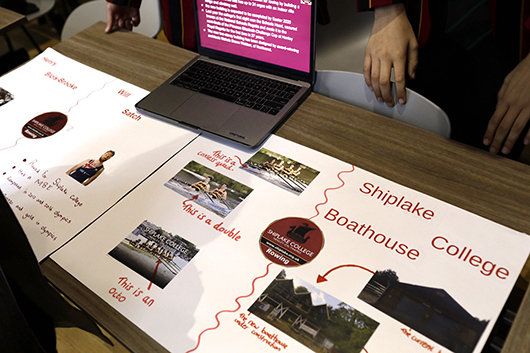
At Shiplake, one way to ignite pupils’ passion for a subject is to encourage them to research and put together a project about something that interests them. Not only does it develop a sense of enthusiasm and pride over the work they have produced, it equips them with useful skills they can take with them into the world of work.
In fact, Assistant Head Academic, Mr Richard Ebbage, believes these skills are vital for giving Shiplake pupils an edge over other students who may be going for the same university places, apprenticeships and jobs:
Project-Based Learning (PBL) is a specific form of knowledge and skill acquisition distinct from the more traditional classroom. In traditional learning, a common approach is direct-instruction from the teacher to pre-defined content. In PBL, students work for an extended time period on a topic which is pertinent to them. Students often have to identify a complex, real-world question or problem and set about gaining skills such as research, planning, time management, problem-solving and communication in order to answer their question or solve the problem. This is more than just ‘doing a project’ - it is a method of skills and knowledge delivery which is more akin to the complex and ever-changing world students will find themselves in outside the school gates.
At Shiplake College, Project-Based Learning has undergone something of a revolution over the past five years. In 2015, three Year 13 pupils submitted an Extended Project Qualification (EPQ). This is a project completed in the Sixth Form and is equivalent to around half of an A Level. Sixth Form students gain UCAS points from completing this qualification and it means those who complete it stand out in their applications, be that for university or employment. With the A Level curriculum reform, we took the opportunity to enter all of our Year 12 students for the EPQ. In the past three years, we have had between 50-80 projects submitted each year by Year 12 students meaning many more students have gained these valuable skills. The current Year 12 are approaching their final deadline and there are some fascinating topics such as 'a comparison of the wildfires in the Amazon and Australia', 'whether religion can change personality' and questions such as 'how can the aviation industry reduce its carbon emissions over the next 5-10 years?’ Alongside this, the Sports Leadership qualification is another form of PBL which Year 12 may opt to pursue.
Since 2018, we have offered our own, in-house form of a Foundation Project Qualification (FPQ) to Year 9. This came from a desire to expose students to independence, decision-making and problem-solving skills earlier in their academic journey. Mrs Bayley has expertly run this from the Thinking Space while covering aspects such as research and presentation skills.
From this term (Summer 2020), Year 10 and 11 are being offered the chance to pursue the Higher Project Qualification (HPQ) as part of the distance learning package offered during the COVID-19 pandemic. We had already initially planned to launch this at school in an activity slot this term, but project-based learning lends itself well to distance learning, with students taking ownership over the process and teachers at the other end of the Google Meet to guide when needed. Students are just starting to explore topics; one student has already expressed an interest in looking at genetic engineering and I look forward to seeing what other interesting topics come forward.
Last, but by no means least, Lower School students in Years 7 and 8 have been using PBL to further explore and embed the Shiplake Seven skills of Determination, Creativity, Open-mindedness, Motivation, Independence, Curiosity and Reflection since Christmas in their Lower School Project. Students have been tasked with coming up with their own topic, planning and researching the topic, producing a written report of 1,000 words, presenting their research (they have done this using screen recording during the lockdown) and finally reflecting on their progress and strengths and weaknesses. There have been some great submissions already and I enjoyed learning more about Skiing from one pupil (did you know there was a war fought mainly on skis? Me neither!) and the evolution of ‘the Big 5’ from another.
What all of this means is that every student at Shiplake College will have had the opportunity to explore something personally meaningful and academically engaging via PBL. There are very few schools where this is the case and I truly believe this is setting our students up for further success in the future. As can be seen from the current global situation, the children of today will be going into a world where the most important skills are about being agile, resilient, and having the ability to solve problems and make decisions. I am confident we are providing them with the confidence to do just that.

About Shiplake Spotlight
Shiplake prides itself on the huge array of subjects and co-curricular opportunities available to all pupils. There really is something for everyone to ignite enthusiasm, passion and creativity. At Shiplake, we encourage pupils to find their ‘thing’. The thing they can’t wait to get out of bed in the morning to do, the thing where they set themselves challenges and goals to get better, the thing that motivates and inspires them.
Each week, we will be bringing you a spotlight on an individual subject or co-curricular activity from our teachers, who for them, this is their ‘thing’. We hope their insights will spark some passion in you to learn something new, or simply find out more about what Shiplake has to offer.





















